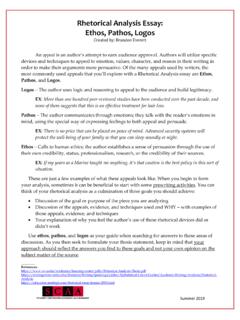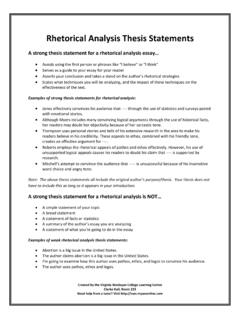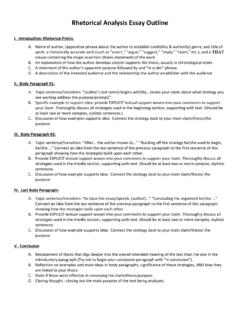Transcription of 2018 AP ENGLISH LANGUAGE AND COMPOSITION FREE …
1 2018 AP ENGLISH LANGUAGE AND COMPOSITION FREE-RESPONSE QUESTIONS Question 2 - Suggested time 40 minutes. (This question counts for one-third of the total essay section score.) In 1997, then United States Secretary of State Madeleine Albright gave the commencement speech to the graduating class of Mount Holyoke College, a women s college in Massachusetts. Read the following excerpt from her speech carefully. Then write a well-developed essay in which you analyze the choices Albright makes to convey her message to the individuals, each of us must choose whether to live our lives narrowly, selfishly and complacently, or to act with courage and faith. As a nation, America must choose whether to turn inward and betray the lessons of history, or to seize the opportunity before us to shape history.
2 Today, under the leadership of President Clinton, America is making the right choice. The Berlin Wall is now a memory. We could be satisfied with that. Instead, we are enlarging and adapting NATO1 and striving to create a future for Europe in which every democracy including Russia is our partner and every partner is a builder of peace. Largely because of leadership, nuclear weapons no longer target our homes. We could relax. Instead, we are working to reduce nuclear arsenals further, eliminate chemical weapons, end the child-maiming scourge of land mines and ratify a treaty that would ban nuclear explosions forever. The fighting in Bosnia has stopped.
3 We could turn our backs now and risk renewed war. Instead, we are renewing our commitment, and insisting that the parties meet theirs, to implement the Dayton And we are backing the War Crimes Tribunal, because we believe that those responsible for ethnic cleansing should be held accountable and those who consider rape just another tactic of war should answer for their crimes. We have built a growing world economy in which those with modern skills and available capital have done very well. We could stop there. Instead, we are pursuing a broader prosperity, in which those entrapped by poverty and discrimination are empowered to share, and in which every democracy on every continent will be included.
4 In our lifetimes, we have seen enormous advances in the status of women. We could now lower our voices and as some suggest sit sedately down. Instead, women everywhere whether bumping against a glass ceiling or rising from a dirt floor are standing up, spreading the word that we are ready to claim our rightful place as full citizens and full participants in every society on Earth. Mount Holyoke is the home, to borrow Wendy Wasserstein s phrase, of uncommon women. But we know that there are uncommon women in all corners of the globe. In recent years, I have met in Sarajevo with women weighted down by personal grief reaching out across ethnic lines to rebuild their shattered society.
5 In Burundi, I have seen women taking the lead in efforts to avoid the fate of neighboring Rwanda, where violence left three-quarters of the population female, and one-half of the women widows. In Guatemala, I have talked to women striving to ensure that their new peace endures and is accompanied by justice and an end to discrimination and abuse. And in Burma, I have met with a remarkable woman named Aung San Suu Kyi, who risks her life every day to keep alive the hope for democracy in her country. These women have in common a determination to chart their own path, and by so doing, to alter for the better the course of their country or community. Each has suffered blows, but each has proceeded with courage.
6 Each has persevered. As you go along your own road in life, you will, if you aim high enough, also meet resistance, for as Robert Kennedy once said, if there s nobody in your way, it s because you re not going anywhere. But no matter how tough the opposition may seem, have courage still and persevere. There is no doubt, if you aim high enough, that you will be confronted by those who say that your efforts to change the world or improve the lot of those around you do not mean much in the grand scheme of things. But no matter how impotent you may sometimes feel, have courage still and persevere. It is certain, if you aim high enough, that you will find your strongest beliefs ridiculed and challenged; principles that you cherish may be derisively dismissed by those claiming to be more practical or realistic than you.
7 But no matter how weary you may become in persuading others to see the value in what you value, have courage still and persevere. Inevitably, if you aim high enough, you will be buffeted by demands of family, friends and employment that will conspire to distract you from your course. But no matter how difficult it may be to meet the commitments you have made, have courage still and persevere. It has been said that all work that is worth anything is done in faith. This morning, in these beautiful surroundings, at this celebration of warm memory and high expectation, I summon you in the name of this historic college and of all who have passed through its halls, to embrace the faith that your courage and your perseverance will make a difference; and that every life enriched by your giving, every friend touched by your affection, every soul inspired by your passion and every barrier to justice brought down by your determination, will ennoble your own life, inspire others, serve your country, and explode outward the boundaries of what is achievable on this earth.
8 1 military alliance established by the North Atlantic Treaty of April 4, 1949 2 peace agreement ending the war in Bosnia, signed in 1995 2018 Exam Question #2 Task: Synthesis Topic: Albright commencement speech Max. Points: 9 Mean Score: What were the responses to this question expected to demonstrate? This year s rhetorical analysis question asked students to identify and evaluate the rhetorical choices made in a commencement address, specifically a speech by Madeleine Albright to the graduating class of 1997 at Mount Holyoke College. As in past years, this year s prompt asked students to consider the rhetorical situation a speaker faces and analyze the choices that the speaker makes in order to elicit appropriate or desirable responses from an audience.
9 Also as in past years, the prompt provided students with key historical information and context. For students who may not have known anything about this history or context, the prompt supplied specifics regarding the audience ( Mount Holyoke College, a women s college in Massachusetts ) and date (1997) and noted the speaker s leadership position at the time ( then United States Secretary of State Madeleine Albright ). This year s task differed from previous iterations in that it was significantly lengthier; however, its LANGUAGE was very accessible to students. Within their responses to this rhetorical analysis question, students were expected to explain the choices Albright made in her particular situation for her particular audience and how these choices work.
10 To understand these choices and how they work, a student must first consider the rhetor s relationship to the audience, as well as how this relationship necessitates both what this specific rhetor should include in and exclude from the speech to this specific audience. Additionally, a student must consider how the rhetor arranges the speech for the particular audience in the specific circumstances of the speech. While elements of style certainly merit consideration, they are not the first ingredient on which rhetors focus when developing strategies to persuade audiences: Style is the third canon of rhetoric, not the first or even the second. In other words, to do well, students needed to understand the purpose of Albright s speech, what the relationship must have been between Albright and her audience, what the audience s attitude toward Albright s message might have been, and how Albright s specific rhetorical choices worked to make the audience more responsive to her purpose.


